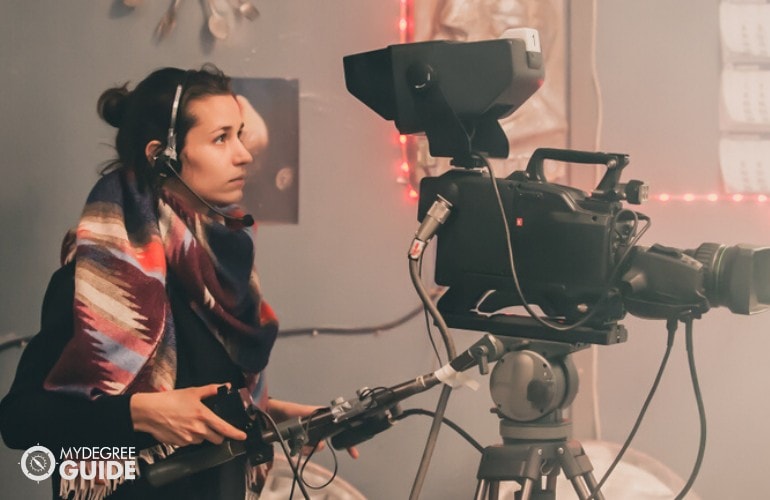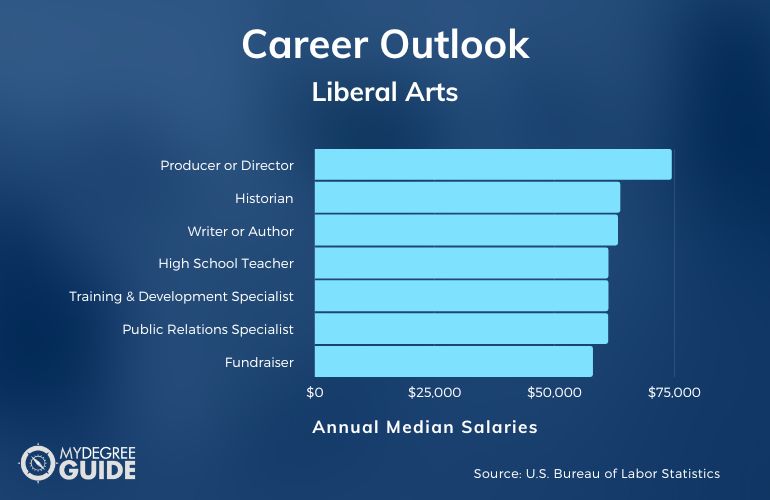Explore Online Liberal Arts Degrees for 2024. Compare bachelor degrees, schools, careers, and salaries.

If you want a broad, diverse education in a wide range of subjects, consider a liberal arts degree online.
Editorial Listing ShortCode:
It’s designed to boost job-ready skills like communication and critical thinking, and since it can be applied to many different fields, you should have plenty of career prospects.
Universities Offering Liberal Arts Online Bachelors Degree Programs
Methodology: The following school list is in alphabetical order. To be included, a college or university must be regionally accredited and offer degree programs online or in a hybrid format.
1. Arizona State University
Arizona State University’s online BA in Liberal Studies program requires the completion of 40 classes. Each class is 7.5 weeks long. There are two required courses: Dimensions of Liberal Studies and Liberal Studies Seminar. Students are also required to take four humanities courses and four social science courses of their choosing and then earn the rest of their credits through electives.
Arizona State University is accredited by the Higher Learning Commission.
2. Bay Path University
Bay Path University is a private institution located in scenic, historic Longmeadow, Massachusetts. Founded in 1897, the school offers all-women bachelor’s degree programs, co-educational master’s programs, and doctorate programs in education and organizational studies. It boasts 30 majors for bachelor’s degrees alone. Bay Path has an enrollment of 3,298 students.
- BA in Liberal Studies
Bay Path University is accredited by the New England Commission of Higher Education.
3. California Baptist University
California Baptist University is a Christian liberal arts university located in Riverside, California. The school was founded in 1950. Today, more than 11,000 enrolled students pursue studies in more than 40 bachelor’s, master’s, and doctorate degree programs. California Baptist University offers a full range of liberal arts studies that includes communication arts, history, government, film, visual arts, modern language, and literature.
- BA in Liberal Studies – English
- BA in Liberal Studies – Human Development
- BA in Liberal Studies – Kinesiology
- BA in Liberal Studies – Social Science
California Baptist University is accredited by the Accrediting Commission for Senior Colleges and Universities of the Western Association of Schools and Colleges.
4. Endicott College
Located in Beverly, Massachusetts, Endicott College is a private college with an enrollment number topping 5,734. The school offers 23 bachelor’s programs. Students also have options for master’s and doctorate programs. In addition, Endicott offers a fifth-year master’s program that makes it easy for undergraduate students to continue their educations.
- BA in Liberal Studies – Educational Studies
- BA in Liberal Studies – Montessori Learning
Endicott College is accredited by the New England Commission of Higher Education.
5. Excelsior College
Excelsior College is a private college located in Albany, New York. Established in 1971, the college is known today for offering flexible in-person and online degree programs. The school boasts an enrollment topping 30,000 students. Bachelor’s and master’s options are available.
- BA in Liberal Arts
- BS in History
- BS in Liberal Studies
- BS in Natural Sciences
- BS in Psychology
Excelsior College is accredited by the Commission on Higher Education of the Middle States Association of Colleges and Schools.
6. Harvard University
Prestigious Harvard University is a private Ivy League research university with a main campus in Cambridge, Massachusetts. The school awards bachelor’s, master’s, and doctorate degrees. Harvard’s 14,000 postgraduate enrollment number eclipses its undergraduate enrollment of 6,800. Founded in 1636, Harvard is the oldest university in the United States.
- Bachelor of Liberal Arts – Humanities
- Bachelor of Liberal Arts – Science
- Bachelor of Liberal Arts – Social Sciences
Harvard University is accredited by the New England Commission of Higher Education.
7. North Carolina A & T State University
North Carolina A&T State University is a public research university located in Greensboro, North Carolina. This historically African-American institution belongs to the University of North Carolina System. Founded in 1891, the university boasts an enrollment of 12,142 students. A&T offers 54 bachelor’s programs, 29 master’s program, and nine doctoral options.
- BA in Liberal Studies – African American Studies
- BA in Liberal Studies – Applied Cultural Thought
North Carolina Agricultural and Technical State University is accredited by the Southern Association of Colleges and Schools Commission on Colleges.
8. Northern Arizona University
Northern Arizona University is a public research university founded in 1899. The school’s main campus is located in Flagstaff, Arizona. Enrollment at the school tops 30,000. Students can choose from more than 158 bachelor’s and master’s programs. In addition, the school offers a number of doctorate and professional programs.
- BA in Liberal Arts
- BS in Liberal Arts
Northern Arizona University is accredited by the Higher Learning Commission.
9. Northwest Nazarene University
Northwest Nazarene University is a private Christian university located in Nampa, Idaho. The school was founded in 1913. It offers more than 60 bachelor’s programs, 11 master’s programs, and a doctoral program. Enrollment is 2,058. In addition to its main campus, Northwest Nazarene University offers learning options both online and at satellite campuses in Boise, Twin Falls, and Idaho Falls.
- BA in Liberal Studies
Northwest Nazarene University is accredited by the Northwest Commission on Colleges and Universities.
10. Northwestern State University of Louisiana
Northwestern State University of Louisiana is a public university with a main campus in Natchitoches, Louisiana. Established in 1884, the university now has a student enrollment of 11,081.
The school is notable because it was one of the first to enter into NASA’s Joint Venture Program (JOVE). In fact, students helped NASA scientists to analyze data and conduct research for the 1996 Space Shuttle Columbia shuttle mission. Bachelor’s, master’s, and doctorate programs are offered at this University of Louisiana System school.
- BA in Liberal Arts
Northwestern State University is accredited by the Southern Association of Colleges and Schools Commission on Colleges.
11. Oregon State University
Oregon State University is a public research university with a campus in Corvallis, Oregon. In addition to its more than 200 bachelor’s programs, the school offers a variety of master’s and doctoral programs. An enrollment number approaching 32,000 makes Oregon State University the largest university in Oregon. It was founded in 1868.
- BA in Liberal Studies
- BS in Liberal Studies
Oregon State University is accredited by the Northwest Commission on Colleges and Universities.
12. Regis University
Colorado’s Regis University is a private Jesuit university in Denver. It was notably founded by the Society of Jesus in 1877. Students can pursue a variety of bachelor’s, master’s, and doctoral programs. Regis University is home of the Regis College of Contemporary Liberal Studies. Total enrollment is 8,368.
- BA in Liberal Arts
Regis University is accredited by the Higher Learning Commission.
13. Rowan University
Rowan University is a public research university situated in Glassboro, New Jersey. It also has additional campuses in Stratford and Camden, New Jersey. Founded in 1923, Rowan University offers 74 bachelor’s options, 51 master’s degrees, and four doctoral degrees. Students can also pursue a number of professional certificates.
- BA in Liberal Studies
Rowan University is accredited by the Commission on Higher Education.
14. Saint Leo University
Saint Leo University is a private Roman Catholic liberal arts university situated in St. Leo, Florida. Established in 1889, the university is associated with the Benedictine institutions of the Holy Name Monastery and Saint Leo Abbey.
The majority of the students who attend this university do so as online students. Saint Leo has enrolled students from all 50 states. Notably, the Saint Leo University Polling Institute was established as a source of nonpartisan data on political opinions and cultural attitudes in 2013. Students can obtain bachelor’s, master’s, and doctoral degrees fully online.
- BA in Liberal Studies degree programs
Saint Leo University is accredited by the Southern Association of Colleges and Schools, Commission on Colleges.
15. Syracuse University
Syracuse University is a private research university located in Syracuse, New York. The interesting history of Syracuse goes back to its days as a seminary founded by the Methodist Episcopal Church in 1831. However, the school has had a nonsectarian status since 1920. Syracuse offers a robust catalog of options for bachelor’s, master’s, and doctoral programs.
- BA in Liberal Studies
Syracuse University is accredited by the Middle States Commission on Higher Education.
16. Thomas Edison State University
Thomas Edison State University in Trenton, New Jersey, provides degree paths that are designed specifically for adult learners. In addition to a variety of bachelor’s and master’s degree options, the school offers two doctoral programs.
Thomas Edison State offers a unique learning platform that is based heavily on online courses that are supported by communication with mentors and other students. The school was founded in 1972 in the spirit of Thomas Edison’s own self-taught approach to mastering subjects.
- BA in Liberal Studies – Communications
- BA in Liberal Studies – Computer Science
- BA in Liberal Studies – Criminal Justice
- BA in Liberal Studies – General Management
- BA in Liberal Studies – Healthcare Management
Thomas Edison State University is accredited by the Middle States Commission on Higher Education.
17. University of Illinois – Springfield
The University of Illinois Springfield is a public university with a campus in Springfield, Illinois. While the school was established in 1969, it didn’t become a part of the University of Illinois system until 1995. The 5,431 students who attend can study a variety of bachelor’s, master’s, and doctoral degree paths.
- BA in Liberal Studies
The University of Illinois Springfield is accredited by the Higher Learning Commission.
18. University of Iowa
Founded in 1847, the University of Iowa endures as a public research university in Iowa City, Iowa. The school consists of 12 colleges offering more than 200 areas of study. Notably, the University of Iowa is categorized as an R1 Doctoral University for its very high research activity. The catalog of bachelor’s and master’s programs offered is also very robust.
- Bachelor of Liberal Studies
The University of Iowa is accredited by the Higher Learning Commission.
19. University of Massachusetts – Lowell
The University of Massachusetts Lowell is a public research university located in Lowell, Massachusetts. Founded in 1894, the school is part of the University of Massachusetts system. The list of six schools within the University of Massachusetts Lowell includes the College of Fine Arts, Humanities, and Social Sciences. Lowell students can study bachelor’s, master’s, and doctoral degree options.
- Bachelor’s in Liberal Arts
The University of Massachusetts Lowell is accredited by the New England Commission of Higher Education.
20. University of North Carolina – Greensboro
The University of North Carolina at Greensboro is a public research university in Greensboro, North Carolina, belonging to the University of North Carolina system. The university offers more than 100 bachelor’s options, 61 master’s options, and 26 doctoral programs. This Greensboro school was founded in 1891.
- BA in Special Programs – Liberal Studies
UNCG is accredited by the Southern Association of Colleges and Schools Commission on Colleges.
21. University of Northern Iowa
The University of Northern Iowa is a public university in Cedar Falls, Iowa. Founded in 1876, the school offers more than 90 majors for its more than 10,497 students. Students can pursue bachelor’s, master’s, and doctoral degree paths. The University of Northern Iowa Liberal Arts Core (LAC) is designed to provide a common liberal arts foundation for all undergraduate students.
- Bachelor of Liberal Studies
The University of Northern Iowa is accredited by the Higher Learning Commission.
22. University of Wisconsin – Oshkosh
The University of Wisconsin Oshkosh is part of the University of Wisconsin System. Nearly 14,000 students enroll in the school’s bachelor’s, master’s, and doctoral degree programs annually. Founded in 1871, the university is renowned for its award-winning UW Oshkosh Model United Nations program.
- BLS in Leadership Development
- BLS in Liberal Studies
- BLS in Organizational Administration
The University of Wisconsin-Oshkosh is accredited by the Higher Learning Commission.
23. Utah State University
Utah State University is a public land-grant research university with a large campus housing around 20,000 students in Logan, Utah. The school is classified as an R2 Doctoral University for its high research activity. In addition, Utah State offers an array of bachelor’s and master’s degree options. Utah State University was founded in 1888.
- BA in Liberal Arts
Utah State University is accredited by the Northwest Commission on Colleges and Universities.
24. Westfield State University
Founded in 1838 by Horace Mann, Westfield State University is a public university located in Westfield, Massachusetts. The school was established as the first public co-educational college in the country without any barriers regarding race, gender, or economic class. Westfield offers a variety of bachelor’s degrees, master’s degrees, and certificate options. Undergraduates have 31 majors to choose from.
- Bachelor’s in Liberal Studies
Westfield State University is accredited by the New England Commission of Higher Education.
25. Wilmington University
Wilmington University is a private university in New Castle, Delaware. Established in 1968, the school made the transition from Wilmington College to Wilmington University in 2007. Wilmington University offers more than 100 degree and certificate programs to its more than 20,522 students. Options are available for bachelor’s, master’s, and doctoral degree programs.
- BS in Liberal Studies
Wilmington University is accredited by the Middle States Commission on Higher Education.
Online Liberal Arts Degrees
What should you study as part of your liberal arts degree? Here are just a few options.
- Liberal Arts
- Anthropology
- Communications
- English
- Film & Media Studies
- General Studies
- History
- Human Services
- Music Production
- Political Science
- Public Administration
- Public Relations
- Sociology
Pursuing a liberal arts degree can give you the freedom to explore a wide-range of academic fields. It all depends on what you do with your education.
Liberal Arts

This is a liberal arts degree without any specializations. It’s known as a generalist degree. Rather than training you for a specific job or industry, it is designed to give you a foundation of knowledge in many different subjects, and you can apply its teachings to a variety of careers.
Many liberal arts degree programs will divide their classes into categories. It might look something like this:
- Humanities – literature, history, poetry, philosophy, religion, languages, cultural studies
- Fine arts – art, music, dance, theater, film, creative writing
- Social sciences – anthropology, sociology, geography, political science
- Natural sciences – astronomy, biology, geology, chemistry, physics
Depending on your school, you might be asked to take a certain number of credits in each category, or you might be given options for minors or professional certificates in a category of your choosing.
Editorial Listing ShortCode:
One thing to note about liberal arts degrees is that you’ll still need to complete two years of general education requirements before you graduate. This means that you won’t be able to escape things like math and composition even as a liberal arts student.
Anthropology

Anthropology is the study of humans, cultures and civilizations. There’s usually a historical bent to it, but you can also study contemporary anthropology as applied to today’s groups and societies.
Anthropology classes touch on a range of subjects. You might be taking archaeology courses in one semester and paleontology courses in the next.
Editorial Listing ShortCode:
You’ll usually be offered focus options depending on your interests. For example, if you like studying non-Western cultures, you can take classes in world religions and art. If you’re interested in science, you can study evolution, human origins and language development.
Consider a focus in anthropology if you’re curious about human beings and how they come together. It’s a broad area of study, and it has many job opportunities for graduates.
Communications

Communications is such a big field that many schools offer it as a major in its own right. If you’d prefer to specialize, however, you can earn a liberal arts degree with an emphasis in communications.
Communication studies are focused on how people engage with one another. Classes can teach real-world skills like technical writing or public speaking, or they can emphasize more abstract concepts like how workplaces can organize their channels of communication for the best results.
Editorial Listing ShortCode:
The growth rate for the communications field is four percent (Bureau of Labor Statistics), so new jobs are being created every day. Common career paths include writer, journalist, news anchor, media planner, human services manager and public relations specialist.
You might enjoy this specialization if you’re a detail-oriented person who wants to improve the efficiency of the communication between yourself and the others around you. You’ll be able to apply these talents to many different industries, so they’re worthwhile ones to develop.
English

English degrees can be particularly useful for those who will need reading, writing, and researching skills for their future careers.
For example, English studies can prepare you for work as a writer, teacher, web developer, historian, librarian or museum curator. They can teach you the analytical skills for everything from examining old documents to uploading fresh content for blogs and social media accounts.
Editorial Listing ShortCode:
They can even be a kickstarter for attending law school or becoming a politician. You’ll need a strong grasp of language in these fields, and English classes are all about mastering the written and spoken word.
Film & Media Studies

Many celebrities have taken film and media studies. So have many actors, directors, producers, screenwriters, camera operators, news anchors and sports correspondents.
You don’t need a desire for fame to be a film and media studies student, however. There are all kinds of industry jobs that will keep you out of the spotlight if you’d prefer to work behind the scenes. You can build sets, for example, or become a computer animation specialist.
You could become a film critic who writes scathing reviews of Hollywood’s latest blockbusters. You could become a reporter, publicist, talent scout or marketing manager.
Editorial Listing ShortCode:
It’s a broad field, and there are many opportunities available. Film and media studies can prepare you for them. It involves a lot more than just watching movies: You’ll also need to learn how to research, analyze, interpret and create your own media.
If you love the industry, consider a degree in film and media studies. It’s a great way to stretch your creative wings even as you learn about the tools and techniques that keep the media going.
General Studies

General studies is a well-rounded liberal arts degree that combines the arts, humanities and natural and social sciences. If this sounds a lot like the liberal arts degree option that you’ve already read about, you’re absolutely right. Some colleges use the terms interchangeably.
When there’s a difference, it’s usually in terms of structure. A general studies degree might have more relaxed requirements than a liberal arts degree. You’ll probably still need to earn the standard 120 credits, but you might have more classes to choose from, or your credit requirements might be more flexible within their university-designated categories.
Editorial Listing ShortCode:
For example, it’s common for a liberal arts degree to have a second language requirement that spans 1 – 2 years. General studies might not ask for this. You might also be allowed to take more interdisciplinary courses, including courses that don’t usually fall under the liberal arts umbrella.
If you’re interested in a general studies degree, ask your school about it. They might combine or supplement it with their liberal arts degree; it might be its own major. You won’t know until you do your homework.
History

Interested in history and want to make a career out of your passion?
Take a look at these salaries from the Bureau of Labor Statistics:
| Careers | Annual Median Salary |
| Post-Secondary History Teacher | $76,890 |
| Writer or Author | $67,120 |
| Historian | $63,100 |
| Librarian | $60,820 |
| Archivist, Curator or Museum Worker | $52,140 |
These are just averages, too. The top-earning historians can make as much as $116,340 per year. The best-paid archivists and curators can take home $91,800 per year.
Editorial Listing ShortCode:
If you’re considering a liberal arts concentration in history, you’ll have plenty of career options. Many classes are designed to strengthen your skills in things like research methods, textual analysis and critical thinking, so you can apply them to a variety of jobs.
You can also build a strong foundation in reading and writing that can take you everywhere from law school to a master’s in education or library science.
In other words, you can do a lot with a specialization in history. It’s a viable option for future liberal arts majors.
Human Services

Do you enjoy helping people? Would you like to give back to your community after graduation? You might find fulfillment with a human services career.
Another deep and diverse field, human services covers a wide range of social and support jobs for people in need. Careers can include social worker, marriage counselor, foster care director, insurance coordinator, substance abuse therapist or community outreach program specialist.
Editorial Listing ShortCode:
You could work in a school, hospital, prison, community center or nonprofit. You could roll up your sleeves and work directly with those in need, or you could tackle administrative problems from behind a desk.
Human services might not be the first thing that you think of when you think of liberal arts degrees, but it’s a legitimate branch of study, and it’s offered by many schools. Contact yours to figure out your options.
Music Production

You feel the beat. You love the bass. You’re a music producer, and you want the degree to prove it.
Liberal arts programs can offer a variety of dance, instrument and music classes, but like its name suggests, music production is focused specifically on the producing side of things. It incorporates both technical skills and abstract, theoretical concepts, so you can indulge your creative side while also gaining real-world competence to put on a resume.
Editorial Listing ShortCode:
Something to note about music production is that it’s sometimes called audio production. It might also have special requirements depending on whether it’s a major, minor or degree specialization.
If you desire a future in the music industry, it can help to have music production credits under your belt. A strong education can be a key ingredient in a successful career.
Political Science

This is another area of study that might not immediately pop to mind when you think about liberal arts, but it’s a valid one. Many colleges classify political science as a social science along with things like geography, sociology and anthropology. All are under the liberal arts umbrella.
What can you do with a liberal arts degree that focuses on political science? It depends on your areas of interest. If you’re good at communicating ideas, you could become an aide, lobbyist, speechwriter or public relations specialist. If you’re interested in global studies, you could become a translator or cultural advisor for another country.
Editorial Listing ShortCode:
If you want to become a politician, that’s an option as well. There are no major requirements for mayors or senators. As a bonus, if you want to learn valuable skills for the campaign trail, a political science degree program might be just what you need to get the job done.
Public Administration

A public administration education can prepare you for work in both government and non-government careers. While its primary purpose is to help you understand laws, policies and other forms of governance, you don’t have to be employed by Uncle Sam to do it.
You can find plenty of jobs to pursue in nonprofit organizations and other firms, agencies and think tanks.
Editorial Listing ShortCode:
As for a public administration degree, your course load might look a little something like this:
- Intergovernmental Relations and Issues
- Personnel Management
- Budgeting for Public Administrators
- Urban Planning and Redevelopment
- Public Policy Formation
Public administration is a degree in its own right, so you don’t have to be a liberal arts major to study it. However, if you want to broaden your understanding of related fields like communications, sociology, political science and health services, a liberal arts degree can be a good foundation for interdisciplinary knowledge.
Public Relations

The world of public relations is a vast one. You’re probably most familiar with agents and publicists, but you could also become a marketing manager, media buyer, event planner, copywriter, fundraiser or promotions coordinator. There’s work available in both the public and private sector for graduates with a PR background.
As for your studies, you’ll probably focus primarily on communication, but your classes might also tap into subjects like business, finance, advertising, administration and project management. There will probably be a psychology or sociology component as well.
Editorial Listing ShortCode:
There can be big payoffs for your academic diligence. The typical salary range for a public relations specialist is $35,350 – $118,210 per year, and the growth rate of the industry is a solid seven percent (Bureau of Labor Statistics).
If you consider yourself a strong communicator, you might want to look into a public relations specialization as a liberal arts major. It can be a lucrative field for those with the right skill set.
Sociology

Sociology is the study of human beings and the societies that they create. It sounds simple, but there’s an entire catalog of specialties and sub-specialties for it.
Are you interested in the social dynamics of different groups? You can take classes in feminism, race relations and LGBT history. Do you want to study abroad someday? You can familiarize yourself with different countries through global studies or cultural seminars.
Editorial Listing ShortCode:
The most obvious path for sociology majors is to become a sociologist, but that isn’t the only option available to you. You can find all kinds of work to pursue in health services, human resources, psychology, law, corrections and more.
Think about a career in sociology if you’re a liberal arts major with an interest in social science. A sociology specialization can prepare you for many different fields, so it’s a very versatile area of study.
Liberal Arts Program Curriculum & Courses

A liberal arts education is a multidisciplinary one. While concentrations are available for specific areas of interest, the purpose of the degree is to expand your horizons and broaden your understanding of various subjects.
In that respect, your coursework can go in many different directions. You’ll have a lot of flexibility when it comes to choosing classes. There’s no one size fits all liberal arts degree.
If you’re wondering about the general subjects that you’ll see in course catalogs, however, here are a few common ones:
- Composition I and II – These are basic, entry-level classes that usually double as a general education requirement. They are designed to teach you the foundations of college-level reading and writing.
- History – History courses are usually broken down depending on their region or time period. For example, you might take American History Since 1865 or The Ancient World: Rome.
- Communication – Communication classes can range from writing seminars to public speaking courses. They can teach you both real-world skills and abstract ideas and concepts about how human beings engage with each other.
- Foreign languages – Many liberal arts programs require a certain number of foreign language credits. In some cases, you might be able to supplement them with cultural studies of another country’s cinema, literature, poetry, politics or history.
- Political science – Political science classes can cover topics like policy, political theory, international relations and public administration. They can also incorporate other disciplines like business and finance.
- Media studies – Media studies can involve everything from popular movies to global news and politics. They can teach you how to analyze, organize and interpret information from various sources.
- Anthropology – If you’re interested in the humanities, anthropology courses touch on many different subjects such as art and linguistics. It can also be studied or supplemented with things like archaeology, psychology or sociology.
- Philosophy – Often taken in conjunction with subjects like ethics and history, philosophy classes can teach you everything from rhetoric and debate to psychological conditions and sociological concepts.
- Religion – You don’t have to be religious to study the religions of the world. These classes might even be required for global studies or Arabic, Asian or Latin American concentrations.
- Sociology – Sociology courses are about people. You can study specific subjects like gender, sexuality and race relations, or you can take broader classes in things like cultural diversity or patterns of social relationships.
Before you enroll in any of these classes, make sure to talk to your academic advisor. Every school has their own requirements for a liberal arts degrees, so you don’t want to take an entire year of Japanese classes just to realize that you only need three credits in global studies to count towards your major.
Liberal Arts Careers & Salaries

According to the U.S. Bureau of Labor Statistics, liberal arts degree holders are employed in many major industries, including journalism, communications, human services, economics, fine arts, political science and more.
While a full list of careers would be too large to print, here are a few that you might recognize:
| Careers | Average Annual Salary |
| Producer or Director | $74,420 |
| Historian | $63,680 |
| Writer or Author | $63,200 |
| High School Teacher | $61,210 |
| Training and Development Specialist | $61,210 |
| Public Relations Specialist | $61,150 |
| Fundraiser | $57,970 |
| Graphic Designer | $52,110 |
As you can see, salaries vary depending on the job and the industry, and this isn’t even including the differences in pay that are based on things like age, degree level, years of experience and local job demand. To get an accurate estimate of your future salary as a liberal arts major, look up the specific job that you’re considering.
Choosing a Liberal Arts Degree

With so many programs to choose from, how are you supposed to know which liberal arts degree is right for you?
One method is to make a list of qualities or priorities that you want in a program. Then, you can compare and contrast different schools to see which ones hit everything that you’ve written down.
As for putting things on your list, here are a few values to consider:
- School quality – Is it accredited? Can you find it in the U.S. News Education Rankings?
- Areas of study – If you’re interested in a particular subject, do they offer it as a major or minor? Is it available through an associate, bachelor’s or master’s program? What are the names of the available courses? Do they sound interesting to you?
- Admission requirements – How do you enroll? Are there different standards for applying to the university versus applying to their liberal arts department?
- Online availability – If you’re applying as an online student, do they have a well-developed e-campus environment with plenty of resources for distance learners?
You should also look at things like tuition rates and graduation rates, but these concerns aren’t exclusive to liberal arts majors.
Admissions Requirements

Every college is different, and so is every admissions process. Here are some common eligibility requirements and how they can vary between universities.
- Test scores – It’s traditional for colleges to require SAT/ACT scores for incoming freshmen, but some have started to experiment with test-optional admissions where these exams are no longer expected.
- Personal essays – Most schools will ask you to write an essay or two. You’re usually given a specific prompt to answer about your interests or career goals.
- Letters of recommendation – These can come from teachers, bosses, counselors, community leaders and other people who can vouch for you. Schools may or may not require them, but if you’re given the option to include them, they can really bolster your application.
- Application deadlines – Some colleges operate on a semester schedule; others have a quarterly schedule. Their deadlines will be different. Additionally, some colleges offer rolling admissions where you can apply at any time of the year without facing the usual deadlines.
Don’t hesitate to reach out to an admissions representative if you have any questions about your school’s policies or procedures.
Accreditation

Accreditation is a voluntary review process for colleges. It ensures that they meet certain educational standards, and it verifies that they aren’t a scam or fraud.
Some schools aren’t accredited. You’re allowed to attend them, but they aren’t eligible to receive federal financial aid like FAFSA, and the degree might not be recognized by future employers. You might also have trouble transferring to other colleges if they don’t accept coursework from unaccredited schools.
There are three types of accreditation:
- Regional accreditation – This is the most prestigious type of accreditation. It’s offered by several accrediting boards in the U.S. that have divided the country into regions. Examples include the Southern Association of Colleges and Schools (SACS) and the Middle States Commission on Higher Education (MSCHE).
- National accreditation – Offered to trade and technical schools, national accreditation is a legitimate form of accreditation, but its credits might not transfer to regional universities. The accrediting boards are different. For example, the Association for Biblical Higher Education (ABHE) is a national accrediting board for religious universities.
- Programmatic accreditation – Programmatic accreditation is given to specific departments or degree programs. Rather than coming from an accrediting board that vets the entire school, it’s given by organizations like the Council for Interior Design Accreditation (CIDA) and the Aviation Accreditation Board International (AABI) for the school’s relevant programs.
If you want to learn more about accreditation, visit the Council for Higher Education Accreditation (CHEA) or the website for the U.S. Department of Education. They both have additional information as well as searchable databases if you want to see if a specific university is accredited.
Liberal Arts Professional Organizations

Professional organizations can be a big help to college students who already know their field of interest. They offer resources like scholarships and job listings, and they’re usually open to a wide range of applicants that include students, professionals, retirees, vendors, lawyers and more.
You can connect yourself to an entire network of people within your industry.
As a liberal arts student, you might want to look for organizations in your specific area of study. For example, if you’re studying anthropology, you could join the American Anthropological Association. If you’re studying history, you could join the World History Association or the National Council on Public History.
If you’d prefer a more general association for liberal arts students:
- Consortium of Liberal Arts Colleges – The CLAC is a professional network for information technology (IT) students who are attending liberal arts colleges. It has conferences, projects, job boards and social media connections for its members.
One thing to note about professional organizations is that they usually have monthly or yearly membership dues. Make sure to ask about discounted membership rates for students.
Financial Aid & Scholarships

Financial aid comes in many different forms, and understanding them is one of the most important steps in figuring out what you’re qualified for and how much you’ll receive.
Your first stop should be the Free Application for Federal Student Aid (FAFSA). Like its name suggests, it’s completely free, and it will automatically determine your eligibility for grants, loans and work-study programs.
If you’re considered a low-income student, you might get a grant like the Federal Pell Grant. It awards up to $6,300 per year based on financial need.
Another option is loans. There are two types:
- Subsidized loans are for undergraduate students under a certain income. If you qualify, the government will pay the interest on your loan while you’re in school.
- Unsubsidized loans are for both undergraduate and graduate students, and they aren’t based on income. However, you have to pay the interest yourself.

Depending on your circumstances, you can take out anywhere between $5,500 – $12,500 per year in student loans.
If you want a job, you can look into work-study programs where your college will connect you with a part-time job on campus. If you already have a job, you can ask your employer if they offer a tuition reimbursement program.
Last but not least, scholarships can help you ease the burden of college costs. They’re available for just about every major that you can imagine, including liberal arts majors, and there are additional opportunities for low-income or high-achieving students.
Scholarships can range from $100 payments to full rides of $25,000 or more, so they’re worth a little research.

What Is a Liberal Arts Degree?
A liberal arts degree is a multidisciplinary degree that draws from many different subjects. It’s usually focused on the humanities, so common subjects are things like art, history, music, literature, ethics and foreign languages.
However, it can involve technical or scientific classes as well.
What Can I Do With a Liberal Arts Degree?

Liberal arts degrees are generalist degrees. This means that they are designed to teach you a broad, diverse range of skills that can be applied to many different industries. They’re different from specialized degrees that prepare you for a specific job or a specific field.
Jobs for liberal arts majors are just as diverse as their applicants. You could become any of the following:
- Writer
- Theater manager
- Music producer
- Teacher
- Case worker
- Anthropologist
- Historian
- Web developer
- Journalist
You could also take your liberal arts degree and apply it to other fields such as business, law, politics, education and health services.
What Is the Best Liberal Arts Degree?

Ask five different people about the best degree programs and you’ll probably get five different answers back. Everyone has their own opinion about what college students should study, but at the end of the day, it’s up to you.
What are you passionate about? Which careers have good salaries and high growth rates? Which schools offer accredited degree programs for liberal arts?
What Classes Are Required for a Liberal Arts Degree?
Every liberal arts program is different, so it’s hard to pin down specifics. You could study ancient civilizations or contemporary politics; you could spend your days painting, playing instruments, writing short stories or speaking in foreign languages.
Just understand that a liberal arts degree isn’t a free-for-all. Most colleges will require you to take a certain number of credits in different disciplines in order to develop a broad and diverse range of skills. You’ll also need to earn general education credits in addition to your major-specific ones as a liberal arts student.
What Is a Bachelor’s Degree in Liberal Arts?

A bachelor’s degree in liberal arts is a four-year degree. The scale typically looks like this:
- Associate degree – 2 years
- Bachelor’s degree – 4 years
- Master’s degree – 1 to 3 years
- Doctorate degree – 4 years or more
However, there are factors that can make your education faster or slower.
Are There Any Accelerated Liberal Arts Degree Online Programs?
There are many degree programs that will speed up your graduation time.
Obviously, if you want to go down the shortest path, then a traditional or online associate’s in liberal arts would be a good choice. But if you want to stick with a bachelor’s degree, the most common alternative is an accelerated program. It might come in the form of 8 – 10 week classes instead of the usual 13 – 15 weeks, or it might condense a four-year bachelor’s degree into three years with the help of evening classes and summer semesters.
Another way to graduate quickly is to enroll in a dual degree program or earn credits through life experience or equivalency programs like the College-Level Examination Program (CLEP).
What Are the Best Liberal Arts Degree Jobs?

You can go down many different roads with a liberal arts degree, and it’ll be up to you to decide which is best suited to your interests and educational goals.
If you want fame and fortune, consider a career in the arts. If you feel the call of helping people, you might enjoy a job in social services or public administration. If you like industries with a lot of growth, new jobs are being created every day in communications, law, education and technology.
What Can You Do With a Liberal Arts Degree?
A liberal arts degree is a generalist degree, so instead of having it train you for a specific job or industry, it can give you a broad foundation of knowledge that can be applied to a wide variety of fields.
You can go into film, literature, archaeology, health services, public relations and even law with a liberal arts degree. You can become everything from a history-loving librarian to a cutting-edge music producer.
A liberal arts curriculum is designed to teach you about communication, critical thinking and problem solving. These skills can serve you well in life no matter what you choose to do with them.
Is a Liberal Arts Degree Useless?

Liberal arts degrees are sometimes stereotyped as useless degrees because they focus on the humanities rather than technical or scientific subjects. However, there are many jobs out there for liberal arts majors, and salaries for some jobs can top $100,000 per year (Bureau of Labor Statistics).
There’s also rising demand in the fields of communications, global studies and political science, so there will be thousands of new jobs for college graduates in upcoming years.
Don’t let anyone tell you that liberal arts is a useless major. With the right degree program, it can be just as lucrative as any other field of study.
What Are the Best Online Bachelor of Liberal Arts Programs Available?
Before you enroll in a degree program, consider the following:
- Accreditation – Has the school been regionally or nationally accredited? Has their liberal arts college gotten programmatic accreditation?
- Acceleration – If you want to get your bachelor’s degree as soon as possible, check and see if the school offers things like night classes, accelerated semesters or dual enrollment plans for motivated students who want to graduate early.
- Accessibility – A good online degree program will have all of the technology and student support that you need to get the same level of education that you would on campus.
It’s okay if researching these things takes a little time. Diligence is the only way to ensure that you’re choosing a high-quality bachelor’s degree program in liberal arts.
How Long Does It Take to Finish an Online Bachelor’s in Liberal Arts Degree?

Most bachelor’s degree programs take four years. This is assuming that your liberal arts degree requires 120 credits, which is common, and that you’re earning at least 15 credits per semester:
- 15 credits per semester x 2 semesters per year x 4 years = 120 credits
There are also ways to speed up your degree if you don’t mind a little extra work:
- Accelerated semesters
- Higher credit loads per semester
- Equivalency credits like CLEP or DSST
- Dual degree programs
- Summer semesters
It’s entirely possible to earn a bachelor’s degree in three years or less if you’re committed to it.
Are There Any Affordable Liberal Studies Programs?
Many bachelor’s degree programs require 120 credits. Since credits can cost anywhere from $300 – $1,000 each, there’s a wide range of tuition prices out there, and it’s hard to give definite numbers about how much your liberal arts degree will cost.
You’ll need to do some research to figure out which colleges are the most affordable for you.
Getting Your Liberal Arts Degree Online

The sky is the limit with a liberal arts degree program. You can find jobs in the humanities and the sciences; you can enjoy high-paying careers with ample growth opportunities.
It all depends on what you do with your education. Enroll in a university online program to take the first step and get started.
